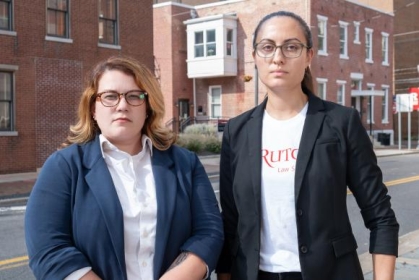Housing Justice Program Scores Win for Camden Tenant

By all accounts, the Housing Justice Program in Camden, which includes the Housing Advocacy Clinic and Eviction Prevention Project, recently achieved a significant win: a judge agreed with attorney Ashley Maddison ’19 that her client’s rental home was so unsafe it was uninhabitable, ordered the landlord to pay for six months of relocation expenses, and allowed the client to retain nearly $7,000 in withheld rent payments. But the reality is much more complicated, shedding light on the need for support and education right in Rutgers Law School’s own backyard.
“While this is a substantive win and a successful financial outcome for the client, it also demonstrates the influence the tenant community is having on the court’s approach to issues related to substandard housing,” says Housing Advocacy Clinic Director Caryn Schreiber. “This is all too common within our client communities generally, nationwide, and within historic Black and brown communities like Camden in particular.”
This client’s journey began in early March 2023, when she contacted the City of Camden about issues related to the home she had been renting for several years. An inspector visited the property and found a litany of code violations including a deteriorating porch, dysfunctional doors and windows, dangerous electrical wiring, subpar plumbing and HVAC, and a hole in the roof that allowed critters to take up residence in the house.
Less than two weeks after the code violation citations were issued, the landlord filed for eviction on the basis of nonpayment of rent. With a July court date looming, the tenant sought help from the Housing Justice Program at Rutgers, and it was then that Maddison began negotiating with the landlord to address the issues.
“We essentially presented him with a clear list of what needed fixing, a timeline of one month, and a good faith payment from our client of one month’s rent to get work started,” Maddison said. “After that month, very little if anything was done.” Meanwhile, the client deposited withheld rent with the court, as ordered, to invoke the habitability defense.
By mid-September, a notice of unsafe structure was placed on the building, barring entry or occupancy for safety reasons. So, when Maddison appeared before a judge for the resulting habitability trial, she asked for 100 percent of rent abatement and relocation assistance. The good news is that the judge agreed, granting the client complete forgiveness on her unpaid rent and up to six months of hotel room payments.
“I hope that this outcome will result in a stable, safe housing situation for the tenant's family,” says Taylor De La Peña, program coordinator at the law school’s Camden Housing Justice Project. “She has three young children with serious health issues, who require her full-time care. Had she moved out of the home without pursuing this outcome, the landlord would have sued her for rent due. Now she will be able to use the money she withheld to obtain stable housing for her family and set them up for success in the future.”
But, as in many cases like this, “a win isn’t really a complete win,” says Maddison. This family of four (plus two dogs) now lives off and on in a single hotel room, and relies on an uncooperative landlord to pay the bill, at times having to stay in their car. Because the home had been deemed unfit for entry, the family also left behind all their housewares, pantry items, cold weather clothing, and other necessities. And, of course, finding suitable and affordable housing will be difficult in the current market conditions.
Plus, the team has already had to defend the win in court twice since trial, attempting to maintain and enforce the order. Housing Advocacy Clinic law students Kaitlyn Owens and Nicolas Hansen, supervised by Schreiber, were enlisted to aid in this effort. Last week, they successfully defended against a motion for reconsideration aimed at overturning the relocation assistance award.
“While this family still faces challenges, the long-term impact of this decision is huge—they are on the path toward safe, stable housing,” explains Maddison. “But, because asserting habitability claims can be a lengthy and risky process, many tenants fear contacting city or county authorities or going through litigation to secure their right to safe housing. Community-wide impact can only happen if more people hold their landlords accountable for unsafe conditions, and we spread the word that tools exist to help tenants enforce their rights. Our neighbors and fellow community members deserve better.”